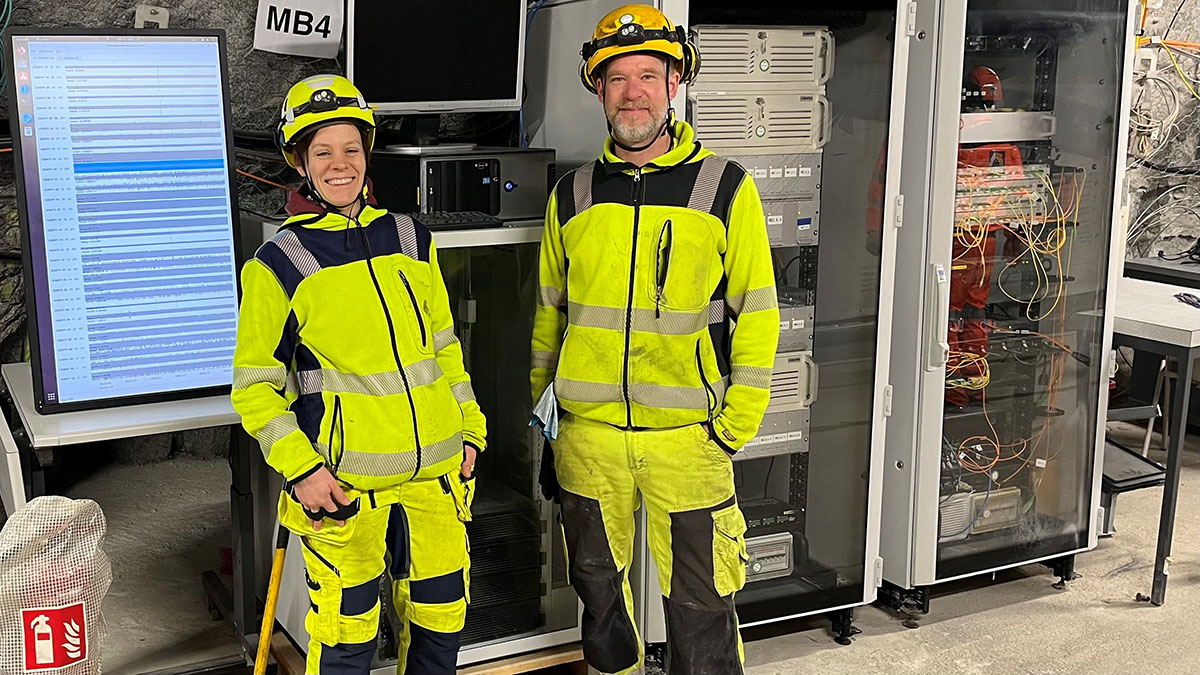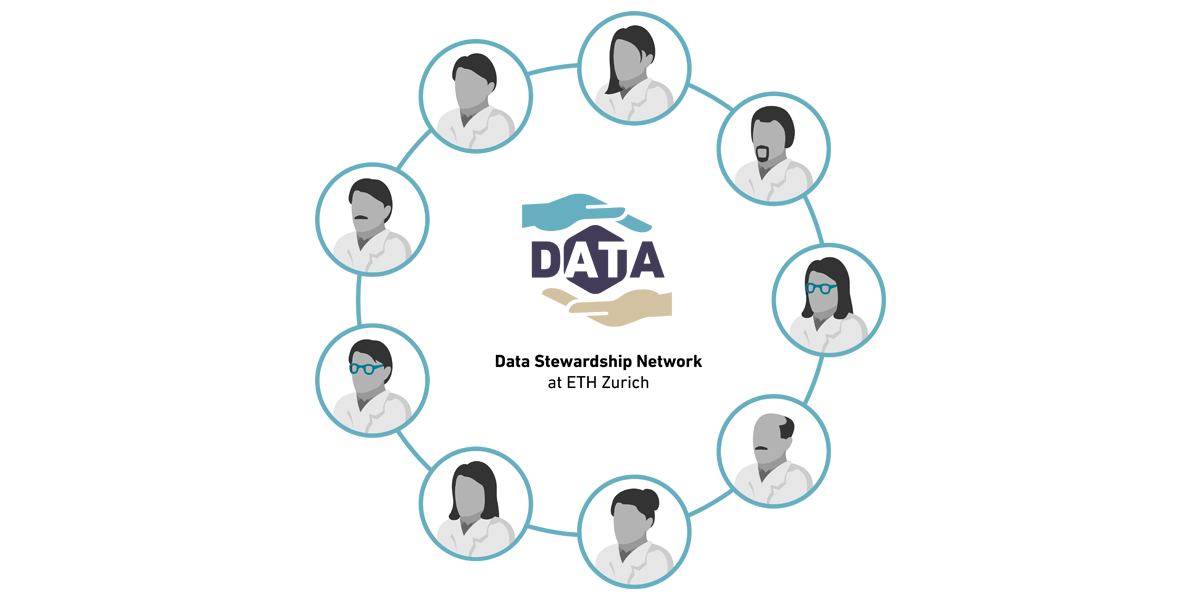Data stewardship in large research infrastructures? Find out how it works in the BedrettoLab
Rebecca Hochreutener und Dr. Marian Hertrich (BedrettoLab für Geowissenschaften und Geoenergien, D-ERDW) im vierten Interview der Reihe zu Modellen von Data Stewardship an der ETH Zürich.

Rebecca Hochreutener and Dr. Marian Hertrich (BedrettoLab for Geosciences and Geoenergies, D-ERDW) in the fourth interview in the series on models of data stewardship at ETH Zurich.
Rebecca Hochreutener has been working as a programme administrator at the BedrettoLab since August 2021. In her role, she is responsible for the smooth running of all research projects in the BedrettoLab. This includes administrative aspects as well as data management. She is a data steward* in the Open Research Data (ORD) project with the ETH Library.
Dr. Marian Hertrich has been working as BedrettoLab Manager at ETH Zurich since 2018. In this role, he is responsible for conducting the various scientific experiments. Marian's scientific focus is on the elastic properties of rocks and how they change during stimulation experiments.
The interview was conducted by Dr. Julian Dederke (ETH Library), who is coordinating a swissuniversities project to establish data stewardship at ETH Zurich. Promoting data stewardship is a goal of both the external page National Strategy on Open Research Data and the external page ETH Domain's ORD strategy.
Rebecca and Marian, you currently work as administrator and lab manager. What are your tasks?
Marian: As lab manager, I am responsible for the coordination and operational realisation of the various projects in the BedrettoLab. These are research projects but also infrastructure expansions. For example, data transfer from the lab to ETH is a challenge, as we generate very large amounts of data - up to 1 terabyte per day during large experimental phases.
Rebecca: In addition to my responsibility for the BedrettoLab administration, I am also in charge of the administrative management of all research and infrastructure projects. As part of the data stewardship project, I am the data steward for the BedrettoLab. I am primarily the contact person for data management and, together with Marian, support the correct storage of research data.
What challenges do you face in your data management tasks?
Marian: The wide variety of data in the BedrettoLab and the quantity are a major challenge. We also generate a lot of data for which there are no international standards yet. Ideally, we would like to be involved in the creation of these standards, which can be very time-consuming.
Rebecca: The development of data management plans with many international collaborations is no easy endeavour. Collaboration also requires the exchange of data, which can be more complex than expected when dealing with terabytes of data. The best solution would be to publish all data annotated and documented in a meaningful way and to make it available to the scientific community.
In connection with your role as a data steward, you are also active in the Data Stewardship Network in a pilot group of data stewards at ETH Zurich. What exchange opportunities have arisen for you in this context so far?
Rebecca: The Data Stewardship Network enables a good exchange with other data stewards who have a different perspective, as some of them work in very different departments and research groups. The exchange of these different experiences is very helpful.
What potential do you see in anchoring data stewardship in research groups and labs?
Rebecca: We believe that integrating data stewardship into various research groups is a good bottom-up approach that will become established over time. Funding opportunities for data stewards are scarce so far, which I believe limits the implementation of data stewardship on a larger scale.
What are the current challenges that researchers at the BedrettoLab repeatedly face with regard to research data management? What are your experiences here?
Marian and Rebecca: The large amounts of data and the diversity of the data are always a challenge - we need to make sure that they can be used both internally and by external partners. Organising and annotating the data is very time-consuming, so that they can be stored and archived properly and according to the FAIR principles. A lack of resources does not support this implementation.
How do you go about improving data management in the BedrettoLab?
Marian and Rebecca: We are working on solutions to improve data management in the Bedretto Lab on a daily basis. We mainly focus on the following aspects:
- organising and annotating the data, which requires a lot of work and the close collaboration with the researchers,
- improving and implementing the data management concept and,
- designing an overarching data management concept that can be implemented nationally and internationally.
In order to realise points one and two, we have advertised a position as Data Manager for the BedrettoLab. This position can be found here.
For point three, we wrote the project proposal DAMOCLES (Data Management Concept for Underground Laboratories) as part of the Open Research Data programme of swissuniversities. The project was approved and started on 1 January 2024.
What is DAMOCLES about? What do you want to achieve and how?
The aim of DAMOCLES is to develop a data management concept that is tailored to the needs and requirements of underground laboratories.
Today, individual data sets are usually archived according to acceptable data management standards.
- How can data sets for integrated experiments be described and labelled with meaningful metadata?
- How can data be easily exchanged between different partners and/or underground laboratories?
- How can data be made understandable/readable and analysable for everyone without prior background knowledge?
- And, finally, what solutions are there for streaming and storing very large amounts of data?
To answer these questions, we will analyse the requirements of the user community and compile a comprehensive inventory of sensors, data, formats and access conditions. Investigating hardware and software requirements for storage, databases and web services of this size are relevant in order to develop a data management concept that meets the requirements of underground laboratories.

ORD project by swissuniversities on the topic of data stewardship
As part of the external page national ORD strategy, swissuniversities encourages all research institutions in Switzerland to promote data stewardship and create corresponding incentives. At ETH Zurich, this goal is being pursued with a project running from 2023 to 2024, which is being coordinated by the ETH Library. All information on the topic of data stewardship can be found on our website.
Read the three interviews from March, July and October 2023 on data stewardship models at ETH Zurich and the news on the launch of the Data Stewardship Network.
Comments
No comments yet